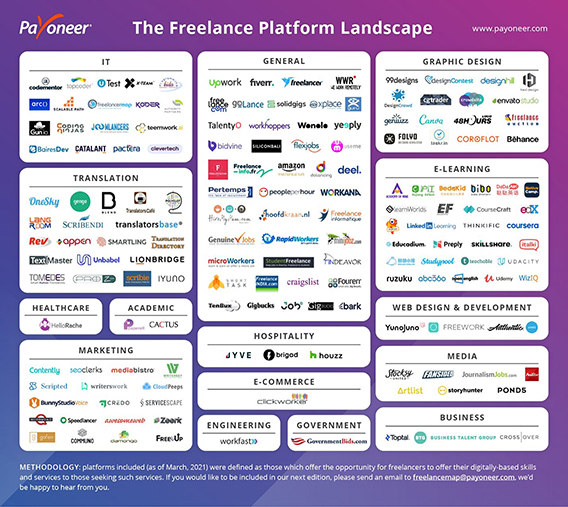What is a Freelancer? Complete Guide

Freelancing is a type of work in which a person is self-employed and works independently for one or more customers providing a professional service generally based on the knowledge economy and digital skills. Freelancers usually work remotely from their home or a collaborative office. They are not employees of any company, work on their terms and conditions, and usually have a flexible schedule.
Freelancing is a great way to earn more money without being tied to a 9 to 5 job. You can choose what you want to do, how much you want to charge, when, with whom, and where you will work. Freelance service providers are hired for short, medium, and long-term projects. Here are all the basics you need to know about being a freelancer.
The following is our opinion only and does not constitute financial or legal advice of any kind.
How does freelancing work?
A freelancer is a self-employed person hired by companies or another person to perform a specific task. Entrepreneurs fall into this category, but freelancers can also be journalists, accountants, designers, bloggers, programmers, etc.
The term “freelance” dates back to the 1700s, when it was used to refer to a mercenary (free and lance). That is, gentlemen who did not serve any specific lord and whose services could be hired by anyone.
As a freelancer, you will have to set up your own business. Although each country has its laws and regulations for freelancers, the most important things to keep in mind are the same wherever you live or have a business.
Choosing a type of legal/tax structure
One of the first steps to becoming a freelancer is to officially register. The type of legal entity you choose will determine tax, personal liability, and paperwork requirements. As a freelancer, depending on where you are located, you must register with the appropriate agency. It varies according to the jurisdiction of each region and/or country.
Paying the right taxes
You can avoid headaches at the end of the tax year by filing returns. Taking steps to maintain a good billing and expense control system from day one will help you with any taxes that arise from your business expenses later on. We recommend that you consult with a tax specialist for more information.
Choosing an insurance policy
You should consider taking out self-employed health insurance to protect you and your family in case of unexpected situations. The peace of mind it gives you as if you were an employee of your own company is priceless.
If you want to work as a freelancer, Safety Wing is an excellent alternative to social security (or social welfare) for digital nomads, made by digital nomads.
Separating personal and business finances
We recommend freelancers open one bank account for their personal finances and a separate account for professional finances. It may seem like a lot of paperwork, but doing so will make you feel more secure, in control of your money, and help you when it comes time to file taxes each year. A few minutes a week can go a long way in managing all aspects of your day-to-day work.
Attracting (and retaining) clients
It can be wise to solidify your position as a freelancer before the competition overtakes you. When you offer a digital service, you’re going to be competing with thousands of people, and your best currency and means of self-promotion are the opinions of past buyers. The modern world of both products and services revolves around reviews. That’s why there are platforms like TrustPilot and Capterra or other non-platforms like Google, Facebook or Amazon reviews.
Writing contracts for freelance projects
You may wonder why it is necessary to make a contract as a freelancer. Because not having an arrangement carries risks. A well-written contract can protect you against possible client non-payment, liability, and legal problems related to your project.
Ensure that both you and the client understand what will happen if something comes up when working together on a new project before everything starts - make sure the details and information are clear so that nothing falls through over time or is overlooked.
Advantages and disadvantages of being a freelancer
The benefits of being a freelancer and operating in the knowledge economy are deciding where you work, how long you work, and what you do. Also, freelancers usually have a lot of free time to spend time with family or do whatever they want.
However, being a freelancer has some disadvantages. You have no guaranteed income, so if there’s no work for you it can cause financial problems. Especially if you don’t have a good pulse on your finances.
Advantages of being a freelancer
Flexibility to do what you like
It is liberating to work independently without anyone telling you when to start your day, when to leave, what tasks to do, and how to do them. You may not always like it, but sometimes, it’s great not to have a boss or co-workers.
Freelancing can be satisfying because you have the opportunity to create your own schedule; you hit the lottery when it comes to getting your time back. If you want to work late into the night to meet family needs, go for it.
On the other hand, if you prefer to wake up fresh at 6 a.m. and start working, then there’s no one to stop you. The bottom line is that freelancers are happy to have flexibility in their lifestyles.
You can choose clients and projects you are interested in
Freelancers can choose their jobs or clients. Many companies that need help in certain areas will be more than happy to work with you. Many workers use social media or cold calling to get in touch and build new relationships with potential clients.
However, once your business is up and running and you’ve started monetising your expertise, you’ll also have the freedom to choose the clients you want to work with. It’s an indescribable feeling. If you feel that in general, you don’t fit the client’s personality, you don’t like someone’s manner, or the payment conditions are not suitable according to your speciality, you can dedicate yourself to finding another job instead of spending your energy on constantly fighting with the client.
The profits are all yours
Freelancers have a number of advantages that come with the territory. Generating income remotely while at home is just the beginning. Freelancers also can keep all of their profits, which they can spend as they see fit. In addition, freelancers have no geographical limitations and can therefore work anywhere globally as long as they have access to the Internet.
Disadvantages of freelancing
It’s you against the world
Of course, freelancing has some cons. One of them is that you can’t call anyone when you have problems: you’re on your own. There’s no support department you can turn to for help.
It can be a lonely working model
It can be a lonely world, especially if you are self-employed. Personally, I’ve felt like I’ve had to work harder to make connections with other people. It’s important to remember that your friends and family are still there for you, though you may not see them as often.
More and more freelancers use coworking spaces like La Colmena, which allow them to be independent without isolating themselves. These shared offices offer affordable office space, plus professional networking groups where you can meet like-minded people with varying experience levels; there’s always time for collaboration!
Each month’s earnings are variable
When you get paid irregularly, you don’t always know how much work you must do to earn the money you need to cover your living costs. Getting regular payments can be a difficult task, especially if you start freelancing without savings or some other kind of financial backing to help sustain the flow of irregular payments.
How to get a job as a freelancer
Freelancers are becoming increasingly popular in the workforce. In fact, it won’t be long before they dominate the workforce across the globe. The Great Resignation happening in the United States is proof of that.
Being an independent provider of professional services means working from anywhere, even from a rural collaborative space. Plus, freelancing can be much more rewarding than working for a company or employer. You are your own boss, and there is no limit to what you can achieve.
Job sites for freelancers
Freelancing is a fantastic way to make money, but it can be challenging to find clients and projects. Lucky for you, we’ve compiled a small list of sites that are looking for qualified professionals.
With the help of each platform, you will be able to get your first jobs. While you can do it in your native language or mother tongue, knowing English is almost mandatory.

In 2021, LinkedIn enabled LinkedIn Services Pages, which is a platform that showcases your services at no cost. Potential clients can contact you for free, regardless of the degree of connection.
Your services will be displayed in your network feeds. Also, your profile will be recognisable in the LinkedIn search bar by members who are and are not in your network, depending on your profile visibility settings. It is recommended that you set it to public.
Conclusion
Hopefully, we’ve helped clarify the main concepts around what freelancers do. Whether you’ve been stuck at home working or if you travel the world with your laptop, a rural coworking space like La Colmena could be a nice addition to your working life. Don’t hesitate to get in touch!